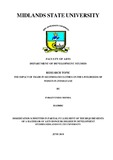Please use this identifier to cite or link to this item:
https://cris.library.msu.ac.zw//handle/11408/4018Full metadata record
| DC Field | Value | Language |
|---|---|---|
| dc.contributor.author | Ndinda, Forgiveness | - |
| dc.date.accessioned | 2020-12-11T11:44:10Z | - |
| dc.date.available | 2020-12-11T11:44:10Z | - |
| dc.date.issued | 2018-06 | - |
| dc.identifier.uri | http://hdl.handle.net/11408/4018 | - |
| dc.description.abstract | The study took a micro-level approach to examine how trade in secondhand clothes has impacted the household livelihood of women in Zimbabwe with particular attention to Zvishavane town. A qualitative research design was used to gather and analyze data. Structured questionnaires and interviews were the main methods used to collect data from the sampled/selected twenty respondents. Information was also gathered through reviewing the already existing literature from journals and internet on recent debates on the role of secondhand clothes trading as a source of livelihood for the urban poor. Purposive sampling was used to identify and select respondents. Findings from the research indicate that secondhand clothes trading has played an important role as a source of livelihood through creating employment for the unemployed and the retrenched labour force. Women involved in this trade have indicated that they can afford basic needs and other services compared to the period when they were not selling secondhand clothes. Food security was improved, women could afford to send their children to school as well as to acquire movable and immovable assets. Secondhand clothes trading proved to be a big employer among women although they encounter a number of challenges such as harassment and torture from the local authority officers, limited capital for growth and lack of skills and knowledge in the business. It is recommended that the local authority and government should work with the relevant stakeholders to create a more conducive environment that support the development of this trade as it is proven to be among the source of community livelihood among women in Zvishavane. | en_US |
| dc.language.iso | en | en_US |
| dc.publisher | Midlands State University | en_US |
| dc.subject | livelihoods of women | en_US |
| dc.subject | second hand clothes | en_US |
| dc.subject | trade | en_US |
| dc.title | The impact of trade in secondhand clothes on the livelihoods of women in Zvishavane | en_US |
| dc.type | Thesis | en_US |
| item.fulltext | With Fulltext | - |
| item.grantfulltext | open | - |
| item.openairetype | Thesis | - |
| item.cerifentitytype | Publications | - |
| item.openairecristype | http://purl.org/coar/resource_type/c_18cf | - |
| item.languageiso639-1 | en | - |
| Appears in Collections: | Bachelor Of Arts In Development Studies Honours Degree | |
Files in This Item:
| File | Description | Size | Format | |
|---|---|---|---|---|
| Dissertation by Forgiveness Ndinda-R143808E.pdf | Full Text | 1.34 MB | Adobe PDF |  View/Open |
Page view(s)
154
checked on Apr 12, 2025
Download(s)
112
checked on Apr 12, 2025
Google ScholarTM
Check
Items in MSUIR are protected by copyright, with all rights reserved, unless otherwise indicated.



